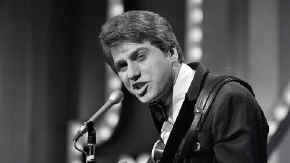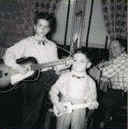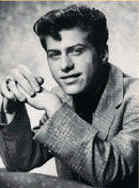

Popularizer of the mid-'60s discotheque scene
through his live recordings at Los Angeles' Whiskey A-Go-Go,
Johnny Rivers successfully covered a number of rock and soul
hits. In addition to Johnny Rivers' major achievements
behind the scenes (discovering the Fifth Dimension and Jimmy
Webb, bringing together top studio musicians as a regular
band), had a total of nine top ten hits from 1964 until
1977. The mark he made on the recording industry is significant.
Johnny Rivers managed to put seventeen songs in the top forty from 1964 to 1977. He was versatile enough to do folk songs, blues, covers of old-time rock-and-roll songs, and some original material, all of them in his own unique style. He was also an adept songwriter, guitarist, and producer.
John Ramistella was born November 7, 1942 in New York City. When he was five the family moved to Baton Rouge. Rivers began playing the guitar at eight, began performing at thirteen with his group the Spades.He made his first record at 14 while he was a student at Baton Rouge High School.
His first record "Hey Little Girl" was recorded on
the Natchez, Mississippi Suede label. On a
summer trip to New York City in 1958, he met Alan Freed, who
changed his name to Rivers and got him a contract with Gone
Records. Legendary songwriter Otis Blackwell, author of
"Don't Be Cruel" and "Great Balls Of Fire"
arranged John's debut single "Baby Come Back" b/w
"Long, Long Walk."
Natchez, Mississippi Suede label. On a
summer trip to New York City in 1958, he met Alan Freed, who
changed his name to Rivers and got him a contract with Gone
Records. Legendary songwriter Otis Blackwell, author of
"Don't Be Cruel" and "Great Balls Of Fire"
arranged John's debut single "Baby Come Back" b/w
"Long, Long Walk."
In 1959 and began touring the American South. One evening in Birmingham, Alabama, Rivers met Audrey Williams, Hank Williams's first wife. She encouraged Rivers to move to Nashville, Tennessee, where he found work as a songwriter and demo singer. Rivers also worked alongside Roger Miller. By this time, Rivers had decided he would never make it as a singer and songwriting became his priority.
Around 1960, Merle Kilgore, then a deejay at KWKH in Shreveport, got him a spot on the Louisiana Hayride. He also introduced him to James Burton, who played guitar with Ricky Nelson's band. Burton took a tape of Johnny's song "I'll Make Believe" back to California and within a month, he called to tell Johnny that Nelson would record it. The song wound up on Nelson's 1960 Imperial LP More Songs By Ricky.

Johnny Rivers moved to the West Coast in the early 60's where
he recorded for a number of small labels and by 1963 found
himself playing at the Whiskey A Go Go on the  Sunset Strip in
Los Angeles. He was the star attraction, and drawing star packed
audiences made the Whiskey L.A.'s hottest night spot.
Rivers signed with the Imperial label and recorded an album
Johnny Rivers Live At The Whiskey A Go Go (#12 1964) that
yielded the #2 hit "Memphis."
Sunset Strip in
Los Angeles. He was the star attraction, and drawing star packed
audiences made the Whiskey L.A.'s hottest night spot.
Rivers signed with the Imperial label and recorded an album
Johnny Rivers Live At The Whiskey A Go Go (#12 1964) that
yielded the #2 hit "Memphis."
Rivers recorded other live albums at the Whiskey over the years. Through the '60s his hits were usually covers and included "Seventh Son" (#7, 1965), "Poor Side of Town" (31, 1966), "Secret Agent Man" (#3, 1966), "Baby I Need Your Lovin'" (#3, 1967), and "Tracks of My Tears" (#10, 1967).
He also started Rivers Music his own label Soul City Records
in 1966. One of the artists that signed with Soul City, James
Hendricks, wrote a song that  Rivers recorded and turned into a hit
with "Summer Rain." Rivers was approached by
Marc Gordon, manager of the Hi-Fis. Rivers liked the group,
signed them to his label, and renamed them the 5th Dimension.
They would have two number one hits on Rivers' label, "Aquarius
(Let the Sun Shine In)" and "Wedding Bell Blues."
Rivers recorded and turned into a hit
with "Summer Rain." Rivers was approached by
Marc Gordon, manager of the Hi-Fis. Rivers liked the group,
signed them to his label, and renamed them the 5th Dimension.
They would have two number one hits on Rivers' label, "Aquarius
(Let the Sun Shine In)" and "Wedding Bell Blues."
In 1967, Rivers performed at the Monterey International Pop Festival and successful covered several Motown classics, achieving a major hit with "Summer Rain."
Rivers had a successful number five album on the LP charts with Realization in 1968; it marked a subtle change in his musical direction, with more thoughtful types of songs. By the end of 1969 he had divested himself of interest in Soul City and ceased personal appearances. He recorded more songs and issued more albums in the early 70's which were a success with music critics but did not sell as well as some of his earlier hits. One of these albums, L.A. Reggae in 1972, dented the LP charts as a result of the top ten pop song that had been included on it, a cover of Huey Smith & the Clowns 1957 R&B record Rockin' Pneumonia - Boogie Woogie Flue
Johnny Rivers 1975
He recorded for other labels, including Atlantic, Epic and Big Tree. Occasionally one of his tracks would reach the top forty, such as his cover of Carl Perkins' "Blue Suede Shoes" in 1973 or the Beach Boys' "Help Me Rhonda" in 1975, on which Brian Wilson helped with backup vocals. His last entry on the charts was "Swayin' To The Music [Slow Dancin']," a top ten hit in 1977. In the early '80s he recorded the gospel album Not a Through Street for Priority Records and essentially retired from the music business.
Rivers's last Top 10 entry was his 1977 recording of "Swayin' to the Music (Slow Dancing). Rivers recorded the title song for the late night concert-influenced TV show The Midnight Special His career total is nine Top 10 hits on the Hot 100 and 17 in the Top 40 from 1964 to 1977.
In 1998 he reactivated his Soul City Records label and released Last Train to Memphis. In early 2000, Rivers recorded with Eric Clapton, Tom Petty and Paul McCartney on a tribute album dedicated to Buddy Holly's backup band, the Crickets.
Johnny Rivers was inducted into the Louisiana Music Hall of Fame on June 12, 2009.
River's farewell tour was in 2019 and last live performance was on July 2023 at Commerce Casino near Los Angeles